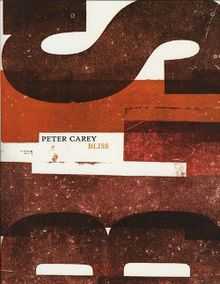Bliss (novel)
| Bliss | |
|---|---|
 First edition (Australia) | |
| Author | Peter Carey |
| Country | Australia |
| Language | English |
| Publisher |
UQP (Australia) Faber & Faber (UK) Harper & Row (US) |
Publication date | 1981 |
| Media type | Print (Hardback & Paperback) |
| Pages | 336 (first edition, hardback) |
| ISBN | ISBN 0-571-11769-4 (first edition, hardback) |
| OCLC | 8075118 |
Bliss is a novel by Australian writer Peter Carey. Published in 1981, the book won that year's Miles Franklin Award.
Plot
Written as a dark, comic fable, the story concerns an advertising executive, Harry Joy, who briefly 'dies' of a heart attack. On being resuscitated, he realizes that the life he has previously drifted aimiably through is in fact Hell – literally so to Harry. His wife is unfaithful with his partner. His son is selling drugs, and his daughter is a communist selling herself to buy them. In one of the novel's more shocking scenes, glimpsed through a window, incest occurs.
Redemption comes in the form of Honey Barbara – pantheist, healer, whore. In the words of the book's blurb "Honey is to Harry as Isis is to Osiris. Together they conquer Hell and retire to the forest where their children inherit the legend of paradise regained." But Harry must die for a second time to be truly saved.
Adaptations
In 1985 Bliss was adapted into a film, Bliss, directed by Ray Lawrence and starring Barry Otto.[1] Commissioned by Opera Australia, Brett Dean and Amanda Holden wrote an opera of the same name, which premiered in March 2010 at the Sydney Opera House, directed by Neil Armfield, conducted by Elgar Howarth, and Peter Coleman-Wright as Harry Joy.
Awards and nominations
- New South Wales Premier's Literary Awards, Fiction, 1982: winner
- National Book Council Award for Australian Literature, 1982: second
- Miles Franklin Award, 1981: winner
References
- ↑ Bliss at the Internet Movie Database
- Bliss at the National Library of Australia
- Mark Roberts review of Bliss from Going Down Swinging Magazine 1982
| |||||||||||||||||
| Awards and achievements | ||
|---|---|---|
| Preceded by The Impersonators |
Miles Franklin Award recipient 1981 |
Succeeded by Just Relations |